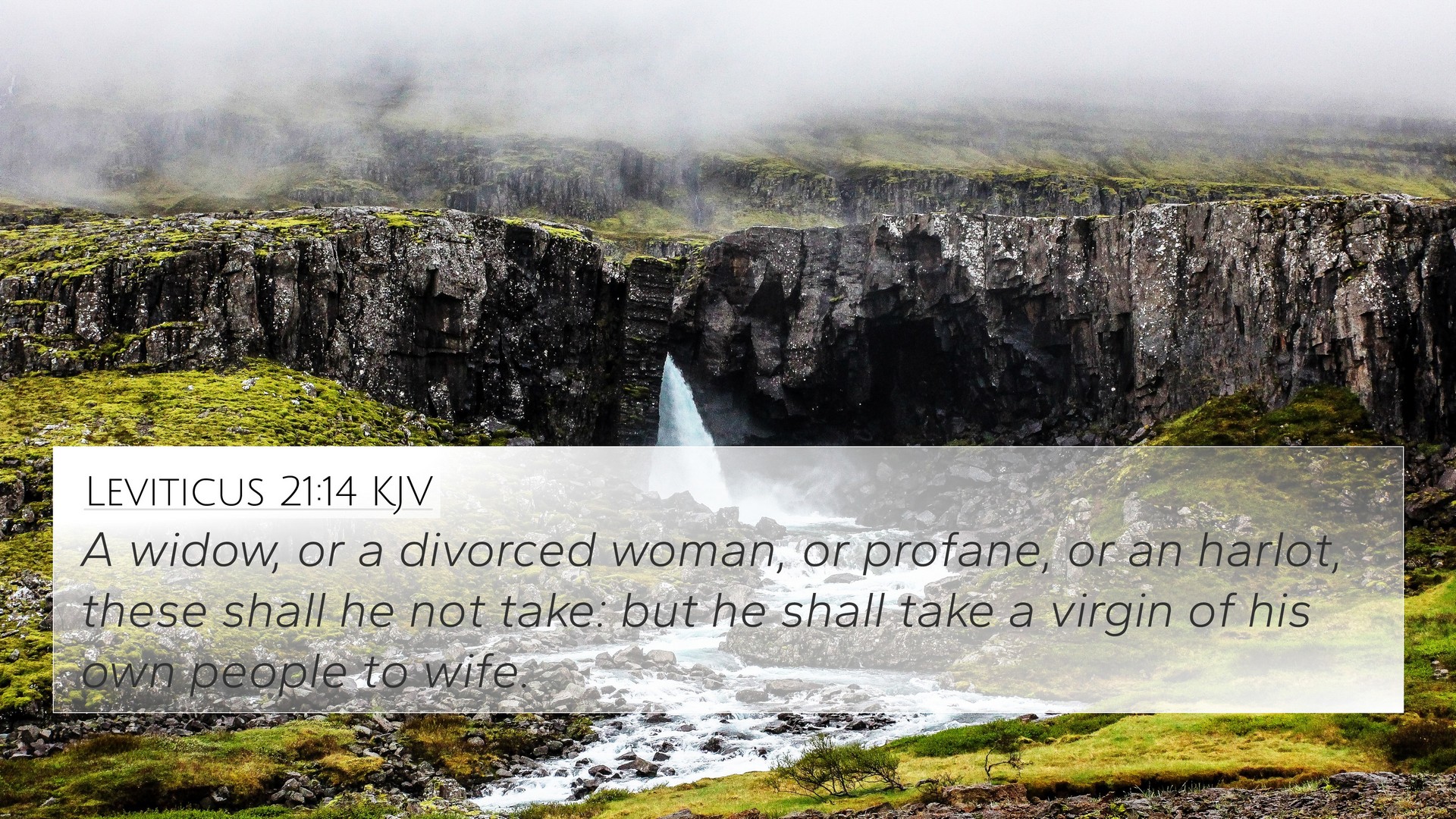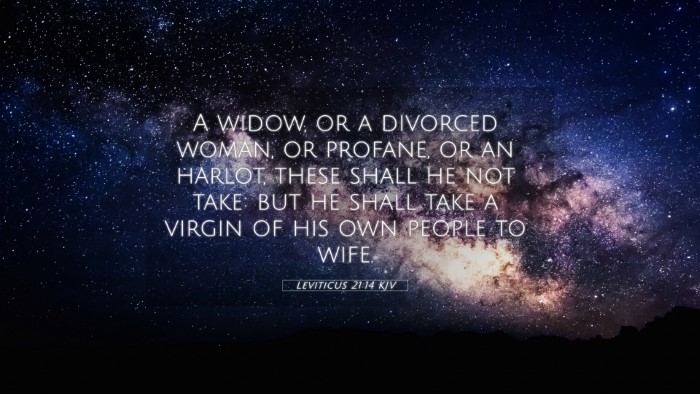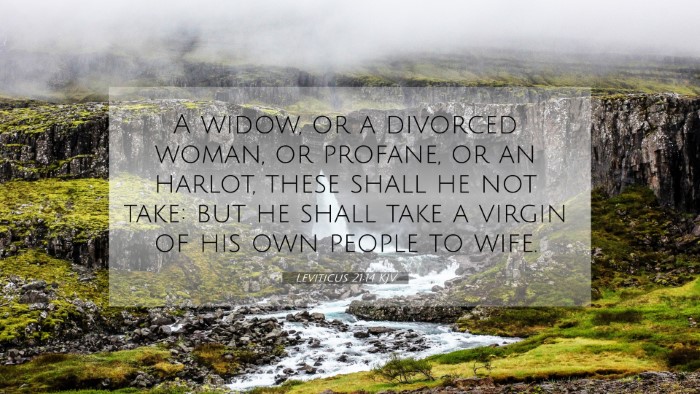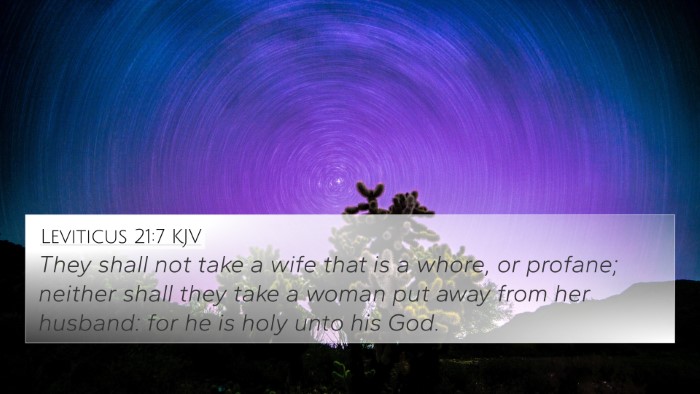Understanding Leviticus 21:14
Verse: "A widow, or a divorced woman, or a woman who is a defiled harlot, these shall not marry the priest; but he shall take a virgin of his own people to wife." (Leviticus 21:14)
Leviticus 21:14 deals with the qualifications for priests in relation to their marriage partners. This command emphasizes the purity and holiness required of those serving in the priestly role. The verse illustrates broader themes of spiritual cleanliness and social order within the Israelite community.
Key Themes and Insights
- Holiness of the Priesthood: The priesthood in ancient Israel was set apart for sacred duties. Matthew Henry notes that priests were to maintain a high standard of personal and moral integrity, which extended to their marital choices.
- Nature of Marital Relationships: Albert Barnes comments on the significance of marriage among the priests, emphasizing that they were to marry women of integrity and virtue, thereby fostering an environment of holiness.
- Reflection of God’s Standards: Adam Clarke highlights that this directive serves as a reflection of God’s standards regarding holiness and separation from defilement. The intention was to create a priestly lineage that honors God’s commandments.
- Community Standards: The restrictions on whom a priest could marry reflect a community standard aimed at preserving the social and spiritual integrity of the Israelite people.
Cross References
Understanding Leviticus 21:14 requires looking at interconnected biblical texts that further elaborate on the themes of holiness and the character of priests. Here are some related scriptures:
- Exodus 19:6: "And you shall be to Me a kingdom of priests and a holy nation..." – This highlights the sanctity required of all believers, not just priests.
- 1 Peter 2:9: "But you are a chosen generation, a royal priesthood, a holy nation..." – Connects the Old Testament concept of priesthood to the New Covenant.
- Leviticus 21:7: "They shall not take a wife who is a harlot or a defiled woman..." – This earlier verse sets the groundwork for the prohibitions in verse 14.
- Malachi 2:7: "For the lips of a priest should keep knowledge..." – Illustrates the role of the priest in maintaining spiritual integrity within marriage.
- Titus 1:6: "If a man is blameless, the husband of one wife..." – New Testament admonition emphasizing the standard of holiness for leaders.
- Hebrews 7:26: "For such a high priest was fitting for us, who is holy, harmless..." – References the greater priestly order of Christ, who perfectly fulfills the requirements of holiness.
- Deuteronomy 24:1-4: Discusses divorce and remarriage rules, which provide additional context to the prohibitions set forth in Leviticus.
Thematic Connections
This verse establishes a clear connection between the purity of marriage and the integrity of priestly service; it calls on readers to consider the moral and spiritual implications of their relationships.
- Integrity in Leadership: The integrity of leaders is crucial in any community—something that extends beyond the priesthood.
- Spiritual Legacy: The choices made by spiritual leaders impact the community's spiritual legacy and familial patterns.
- Cross-Referencing Biblical Texts: Connecting Leviticus 21:14 with passages from the New Testament highlights the continuity of God's call to holiness across the Scriptures.
- Comparative Bible Verse Analysis: Analyzing the differences between Old Testament priestly laws and New Testament teachings provides richer insights into God's redemptive plan.
Cross-Referencing Tools and Resources
Utilizing available tools for Bible cross-referencing, such as concordances and study guides, can enhance understanding:
- Bible concordances to find links between related verses.
- Bible cross-reference guides for thematic study.
- Resources for comprehensive Bible cross-reference materials.
- Cross-reference Bible study methods to explore connections between texts.
- Using inter-Biblical dialogue to deepen one's grasp of scripture themes.
Conclusion
Leviticus 21:14 serves as a profound reminder of God’s call to holiness, impacting not only those in priestly roles but also the larger community. Through a robust understanding of this verse and its connections within the canon, believers are encouraged to pursue integrity in their lives and relationships.




